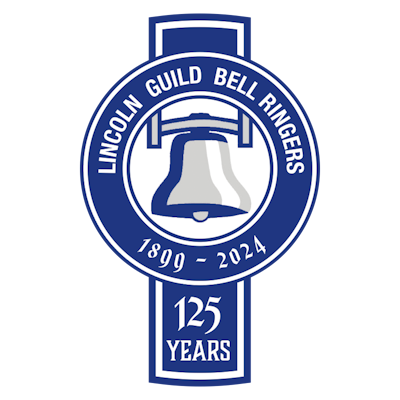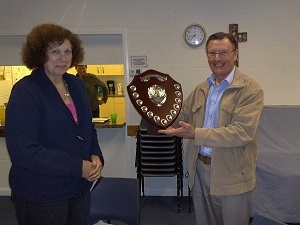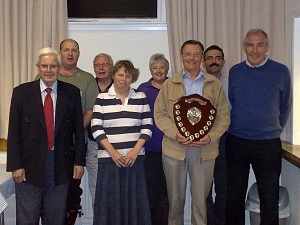Guild 8 Bell Striking Competition Final - 15th October 2011
It was a lovely sunny autumn afternoon in Barton-upon-Humber when I arrived for the final of the inter-branch 8 bell striking competition.
The judges were already installed in their appointed place and people were congregating in the hall on the north side of St. Mary's church. It was evident that a good deal of organisation had taken place and an impressive looking buffet was being laid out on a long table in the hall.
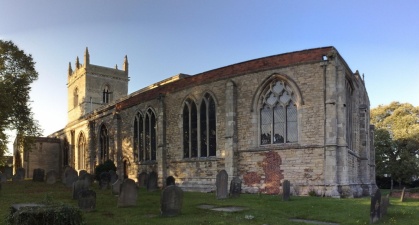 |
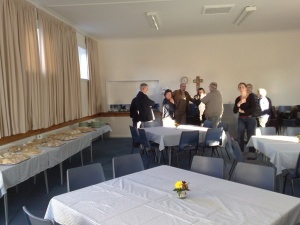 |
There were 5 teams taking part and the draw had already been made some time previously. This allowed ringers to turn up in time for their appointed time slot and avoided any unnecessary waiting around. The order was as follows
5:00pm - West Lindsey Branch
5:25pm - Northern Branch
5:50pm - Southern Branch
6:15pm - Central Branch
6:40pm - Eastern Branch
The test piece was 4 courses of Little Bob Major. There was no mandatory requirements to adopt a particular touch and it was left to the team concerned to work out how best to acheive the 4 courses. The competition rules followed the usual format of a 3 minute practice session followed by the test piece. The start of the test piece was indicated by ringing the treble hand and back a couple of times.
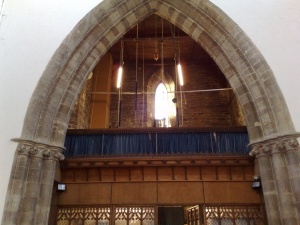 |
The competition started exactly on time at 5:00pm with the West Lindsey Branch commencing the proceedings.
At 5:30pm the buffet opened and cups of tea and coffee were served. This was a rolling buffet that members could dip into over the course of the afternoon as best fitted in with their allotted ringing time.
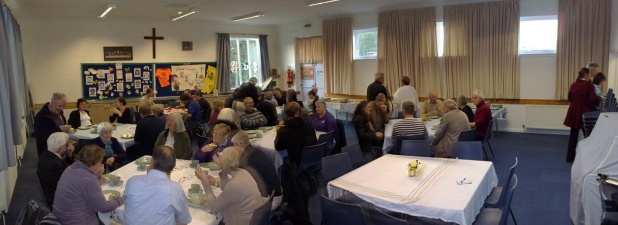 |
Whilst the contest was in progress, members chatted away in the hall, or walked round the church, or sat outside and listened to the various teams ring their test piece.
The competition concluded at about 7:00pm and the members gathered in the hall to eagerly await the results of the competition. The Henry Law James Shield for which we were competing, was placed out on the head table by the Guild Master, Alan Payne.
There was wait of about 30 minutes while the judges conferred. Whilst this was happening and seeing as everyone was present, the raffle was drawn and won by Rose Lennon. The 100 club winners were also drawn. The judges then came over to the hall to announce the results. The judges were Philip and Heather Grover from Newark. They had been installed in the upstairs bedroom of a house opposite the church, with the very kind permission of the owner, a lady called Diane.
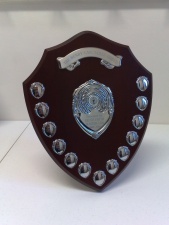 |
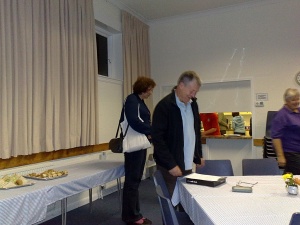 |
Alan Payne started the proceedings, thanking the Barton ringers for the use of the bells and thanking Andy and Jenny Bennett for organising the buffet. He also thanked Diane for the use of her upstairs bedroom to house the judges. He then introduced Philip and Heather Grover and handed over to Philip who spoke on behalf of both ot them.
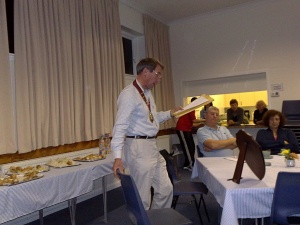 |
Philip started by thanking the guild for inviting him and Heather to judge the competition and stated what a pleasure and honour it had been.
He continued by saying that the ringing generally was very very nice. There was no bad ringing, no one fired out, it was generally of a good standard and no one disgraced themselves.
He observed that in nearly all cases the practice pieces had all been particularly poor which had led him to believe that the bells might be "a bit tricky"
The Results and Commentary
By the power of modern technology (i.e. my phone!) the entire transcript of Philip's observations are available and published here. If the writing style seems a little perculiar, this is because it is more or less verbatim what Philip said. The following are (more or less) Philips own words. The judges also had no idea of the order the teams competed in, although they have been included here for completeness.
Team 1 - West Lindsey Branch (50 faults)
"The practice piece started a bit shakey, but once you got going it was much improved as a test piece. A little bit clippy to start with but it settled down into a nice rhythm. There was kind of a biggish method mistake or a bit of a schmozzel in the middle of the second course which sort of rattled things a little bit and unsettled the rhythm a little bit and another one in precisely the same position in the third course which was quite interesting. What I would say about this team, goodish ringing, but some inconsistent leading. The tenor set a very nice steady pace. The smaller bells though tended to clip a little bit throughout, but neverless this was a consistent piece of ringing and generally nice to listen to. The best ringing was in the second and third courses, then the last course got a little bit nervous really. Overall a respectable piece of ringing."
Team 2 - Northern Branch (60 faults)
"Slower ringing, slightly hesitant. A little bit inconsistent at times. Almost trying a little bit too hard. Very striking contest(y) type of ringing really. Careful to avoid clips and so on. Some very nervous leading, some uneven leading at times. A number of fairly stoppy leads at times. Quite a lot of gaps. Not many full faults though and no serious method mistakes although there was a biggish unsettled patch in the first half of the last course. But it seemed to be more a case of avoiding clips and trips really, at the expense of a settled rhythm. You could tell this was a striking contest piece but never the less it was a respectable piece of ringing and certainly not a bad piece of ringing so well done for that."
Team 3 - Southern Branch (42 faults)
"Steady beat. Started very very well and then sort of deteriorated unfortunately and it seemed to slow down as well towards the end although it started off reasonably briskly and then it sort of slowed down. It was quite accurate ringing. Certainly quite accurate to start with, with some method mistakes or seemingly some method mistakes in the last couple of courses, but generally again a respectable piece of ringing."
Team 4 - Central Branch (30 faults)
"Not a very promising practice piece and then it suddenly turned into a thoroughly good piece of ringing. Nicely paced throughout, a measured pace. Again you could tell it was a striking contest. It had that measured kind of feel about it and the tenor (rung by Phil Mason - Webmaster) kept a superb rhythm and we thought really in this particular one the treble, whoever rang the treble, I don't know who rang the treble in this team 4 (it was Les Townsend - Webmaster) but the treble knew exactly what they were doing, it was almost completely faultless and I commend that. There was a certain amount of clipping on the smaller bells, I don't want to single people out, but certainly on this one the treble was absolutely in control I thought. It started well and it improved, except towards the end of the last lead it suddenly started to show signs of faltering, but it got to the end. I thought that this was a thoroughly good piece of ringing. Very very good. Very enjoyable to listen to."
Team 5 - Eastern Branch (36 faults)
"Again the practice piece showed little promise. However, as soon as the band got the pace of the bells, the ringing settled down very quickly to a super pace, brisk, bright, enjoyable to listen to. We thought this was at times (not all of the time) but at times this was the nicest ringing of the afternoon. However it did suffer from lapses of accuracy. Interestingly the band chose to ring plain courses, which we thought was most interesting. The second course started really crisply, superb ringing, very few clips and then suddenly started to falter towards the end of the course with some quite serious trips really. However it recovered and again there was some super ringing in the third course, some of the best we've heard today. We thought this was kind of a relaxed and competant piece of ringing, it had all the hallmarks of a fairly chilled kind of band (laughter!), somewhat experienced but without enough attention to detail at times, but again a really really super piece of ringing this and we enjoyed that."
On Judging Striking Competitions
Philip also added this comment on judging striking competitions
"Judging ringing competitions is not a scientific art. As anyone who has judged a ringing competiton will know, it's not a relaxed time. We adopted a methodology where clips were awarded half faults and if there was a change with a two clips in it, then we would call it a full fault or if there was a clash we would give a full fault and if it was worse than that, maybe a very very big clash, big big crunch, then you would get a couple of faults or more perhaps, but nobody fell into that category. We were dealing with clips, half faults and full faults generally but mostly half faults and we took an average (of both judges scores)"
The judges' pronouncement complete, Alan Payne announced the Central Branch the winners of the Striking Competition with the Eastern Branch runners up. The complete results are shown below
So the Central Branch retain the Henry Law James Shield, which was presented to Mr. David Fox of the Central Branch Team, by Mrs. Heather Grover.
Their being no other business, the bells of St. Mary's were made available for some general ringing before people made their way home. Ringing included some Grandsire and Plain Bob Major.
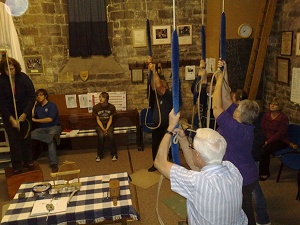 General Ringing |
Plain Bob Major |
All in all a very enjoyable afternoon, with some excellent ringing and a reasonable turn out. Many thanks to all who made it possible.
Jonathan Clark (Webmaster)
